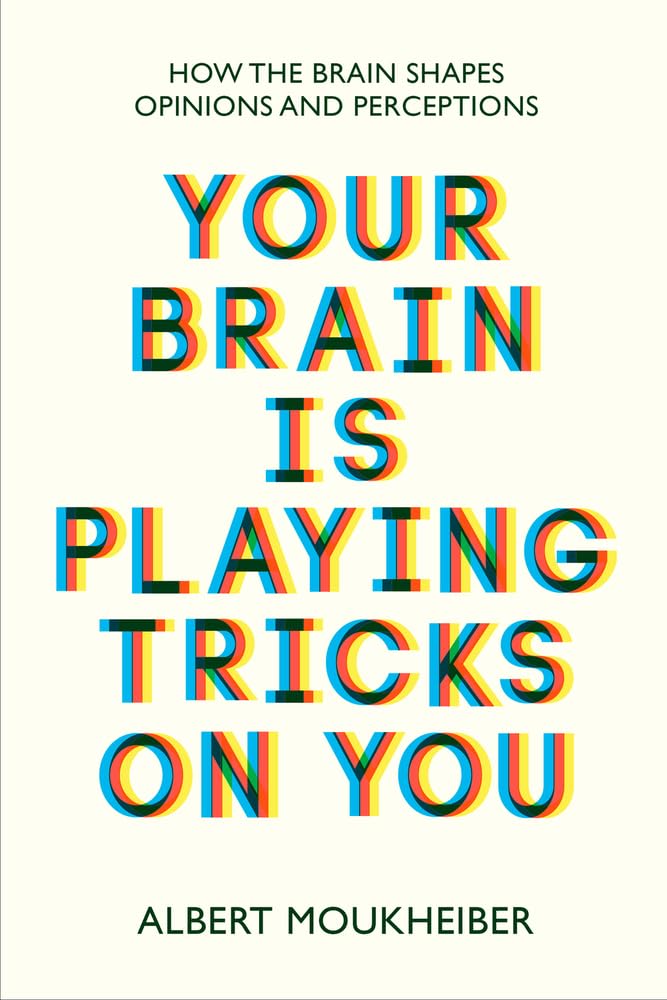Perception and Reality
In this captivating journey through the corridors of our minds, the author guides us through the intricate dance between perception and reality. Picture this: your brain, that marvelous organ, is an artist constantly painting your reality. But here's the twist: it's not always painting a faithful portrait. Moukheiber brilliantly puts it:
"Your brain takes a limited amount of data and creates a perception, which you experience as reality."
Isn't that intriguing? Our brains are master illusionists, conjuring up perceptions that might not necessarily match the objective reality. It's like watching a magic show where reality's edges blur into a captivating illusion.
But why does this happen? Our brains, it turns out, are wired to conserve energy and process information efficiently. This means it often takes shortcuts—filling in gaps and smoothing rough edges—to make sense of the world. Remember that time you were sure you saw something out of the corner of your eye, only to realize it was a trick of the light? That's your brain at work, playing its crafty tricks.
Moukheiber dives into the fascinating world of cognitive biases, those subtle quirks that nudge us off the path of objective reality. From confirmation bias, where we seek information that aligns with our existing beliefs, to the illusion of control, where we feel more in charge than we actually are, our brains are the ultimate storytellers, sometimes weaving tales that can lead us astray.
Yet, fear not, for knowledge is power! By unraveling these perceptual illusions, we can empower ourselves to see through the smoke and mirrors. We can train our brains to be more critical, to question, and to embrace a richer, more nuanced understanding of the world around us.
Confirmation Bias
Ever found yourself nodding along to opinions that mirror your own while conveniently ignoring those that challenge your beliefs? Welcome to the confirmation bias party! This cognitive quirk convinces us to seek out information that confirms what we already think while conveniently sweeping contradictory ideas under the mental rug.
Moukheiber unravels this bias with a keen observation:
"Confirmation bias feeds on our natural tendency to ignore or dismiss evidence that challenges our beliefs."
Ah, the human brain, a master of subtly shaping our perceptions without us even realizing it. It's like being at a buffet and only picking the dishes you already know you like while pretending the rest don't exist.
Imagine a world where our brains do a little jig whenever they encounter something that aligns with our preconceived notions. The result? We become trapped in an echo chamber of our own making, convinced that everyone else must surely see things as we do. But fear not, dear reader, for knowledge is power.
As we navigate this illuminating book, let's pause and reflect on our own experiences. Have you ever been caught up in the clutches of confirmation bias? Have you clung to certain sources of information while conveniently ignoring the others? It's a sly trick our brains play on us, but understanding it gives us the upper hand.
"The idea is to actively seek out information that challenges your beliefs," says Moukheiber.
With these wise words, we find the antidote to confirmation bias—the art of seeking out opposing viewpoints, diving into the uncomfortable, and opening our minds to the vast spectrum of opinions out there. As we continue this captivating journey through the labyrinth of our own minds, remember the lessons of confirmation bias. Stay curious, challenge your own assumptions, and embrace the joy of mental growth. Your brain may play tricks, but you hold the power to outwit them.
Cognitive Dissonance
You see, cognitive dissonance is like a sneaky magician performing tricks within our minds. It's that uneasy feeling we experience when our thoughts clash with our actions or other beliefs. Moukheiber aptly illustrates this:
"As we perceive the world around us and try to understand it, our brain takes shortcuts and sometimes perceives things that aren’t actually there."
It's as if our brain, in its pursuit of simplifying things, might occasionally trip over its own shoelaces.
Think about it - you know you should hit the gym, but you find yourself parked on the couch, indulging in Netflix and nachos. That's cognitive dissonance in action, my friends! Our brain doesn't like the discomfort of holding contradictory beliefs or actions, so it strives to find harmony between them.
Moukheiber masterfully guides us through the subtle dance between our mind's desire for consistency and its ability to sometimes blur the lines:
"Our brain has a talent for making us believe that we are right and for finding justifications for our actions, even when they conflict with our core values."
It's as if our brain is handing out backstage passes to an elaborate show of justifications, attempting to maintain the illusion that all is well in our little world.
But here's the kicker: acknowledging cognitive dissonance is the first step towards mental acrobatics. Moukheiber suggests that by recognizing this tendency, we can consciously engage in thoughtful reflection and, dare I say, mind-bending adjustments:
"By understanding cognitive biases and trying to mitigate them, we can strive for a more open and rational approach."
Emotions and Decision-making
Albert Moukheiber delves into the mind's backstage, where emotions pull the strings of our decisions more than we might realize. Moukheiber's words echo the intricate connection between our feelings and our choices:
"Emotion is the propulsion behind our decisions, and it significantly influences how we perceive the world around us."
Ah, the emotional orchestra of our brains! With every decision we make, whether it's what to have for breakfast or which career path to follow, our emotions are intricately woven into the fabric of choice. It's like a grand symphony where each note of feeling plays a role in composing the melody of our decisions.
But wait, there's a twist! Our emotions, those enchanting tricksters, can sometimes lead us astray. Moukheiber sheds light on this as he peels back the layers of how emotions can cloud our judgment:
"Our brain is adept at turning emotions into beliefs, and beliefs into perceptions. The emotions we experience shape the reality we perceive."
Imagine our emotions as artists who paint our perceptions with shades of bias. Our feelings can subtly nudge our interpretation of events, sometimes veiling us from the bigger picture. But don't fret, dear reader! Moukheiber isn't here to leave us in the dark. He's here to empower us with the knowledge to untangle this complex web.
By understanding the intricate dance between emotions and decisions, we can embark on a journey of self-discovery. We learn to recognize the melodies our emotions play, giving us the power to pause and question whether they're leading us towards a harmonious choice or a dissonant decision.
Neuroplasticity and Adaptation
At the heart of this exploration lies the concept of neuroplasticity—the brain's masterful knack for reshaping itself in response to experiences. As Moukheiber brilliantly illustrates:
"In the realm of the brain, change is the rule rather than the exception."
Isn't that mind-boggling? Our brains are constantly dancing with change, rewiring and rewiring again, sculpting themselves based on our interactions with the world. It's like having an ever-adapting toolkit right inside our heads!
Consider the story of Jane, who suffered from a stroke that left her partially paralyzed. Here's where neuroplasticity swoops in like a superhero:
"When Jane's brain was deprived of its usual commands to move her arm and hand, her brain circuits responded by reorganizing themselves."
See the magic? The brain didn't just give up; it sprang into action, rerouting its connections to find new pathways for Jane's recovery. It's as if our brains are constantly whispering, "Adapt or bust!"
But here's the real kicker: adaptation isn't just about recovering from injuries. It's also about how our brains craft our opinions and perceptions. Moukheiber illuminates:
"Our minds are astonishingly adaptable, rewriting the script based on the information we receive."
This means that when new information arrives, our brains don't just stick to the old script. No, they're master editors, revising our beliefs, thoughts, and perspectives to keep us aligned with what we learn.
Influence and Manipulation
Moukheiber unravels the intricate dance between our perceptions and the external forces that mold them. You see, dear readers, our brains are not always the objective observers we assume them to be. Instead, subtle cues and outside manipulation can easily sway them. As Moukheiber eloquently states:
"Our minds are constantly under the influence of external cues that we may not even notice."
It's like a magician skillfully diverting your attention, leaving you oblivious to the trick being played. Our brains, without our conscious consent, are vulnerable to the art of manipulation, often leading us to conclusions that may not necessarily be rooted in reality.
Moukheiber delves into the concept of confirmation bias, where our minds tend to seek information that supports our pre-existing beliefs. He sheds light on the echo chambers of our thoughts:
"We create our own feedback loops of selective perception."
This explains why we find comfort in consuming information that aligns with our viewpoints, inadvertently closing the door to alternative perspectives. Our brain's susceptibility to this form of manipulation leads to a distorted reality, one where our opinions solidify without considering the full spectrum of information.
But fret not, for Moukheiber doesn't just illuminate the vulnerabilities; he also equips us with the tools to navigate this intricate landscape. He introduces us to the concept of metacognition, the ability to think about our own thinking. This newfound awareness empowers us to break free from the shackles of manipulation.
"Metacognition is the powerful tool we have to override our brain's automatic programming."
Armed with this knowledge, we become the guardians of our thoughts, steering clear of the alluring traps of manipulation and allowing rationality to triumph.
These key concepts provide a glimpse into the book's exploration of how our brain shapes our understanding of the world and how awareness of these processes can lead to more informed and mindful decision-making.

